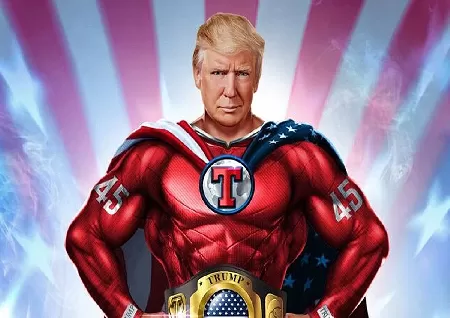Donald Trumps NFT Sale Is the Weirdest Thing on Social Media Today

Earlier this week, Donald Trump informed his supporters that America needed a superhero and promised a "big" surprise. The major announcement, it turns out, is that Trump is selling 45,000 non-fungible tokens (NFTs) for $99 each, which are basically digital cartoons of him in various poses: as a superhero, a businessman, a businessman with a basketball, and so on.
The announcement was a letdown, and one that begs lots of questions: Whose idea was this? Why act now, months after the majority of potential buyers have realised that NFTs are a bad investment? And who stands to profit?
Trump's declaration was unusual for a man ostensibly running for president—he declared his third quest for the White House just one month ago. The revenues will not go to Trump's campaign, according to the fine print on the website selling the Trump photos. Instead, they go to NFT INT LLC, a firm Trump does not own or manage, according to the fine language. It just licences Trump's name and likeness from another (presumably Trump-affiliated) company, CIC Digital.
Neither NFT INT LLC nor CIC Digital have a recognisable online or offline presence. Both firms were formed in Delaware this year, thereby shielding their ownership and administration from public scrutiny. (An email sent to the website selling the NFTs was not returned.)
According to the sales website, 45,000 Trump NFTs have been manufactured and are selling for $99 each, earning the creator—whoever he or she is—approximately $4.4 million. NFTs, on the other hand, are intended to be digital assets that an investor might potentially resell for a profit. However, as of Thursday afternoon, that seemed doubtful.
One of the biggest websites where NFTs are bought and traded, OpenSeas.io, revealed that approximately 4% of the Trump NFTs were listed for sale there. And while some did sell (about 500 by 5 p.m. Eastern on Thursday), the average price was $105—roughly the same price the initial buyers paid, after fees. Furthermore, companies like OpenSeas charge their own fees, and project creators receive a whopping 10% commission on each transaction as a "creator fee." So, for anyone other than the author to profit, the price of each NFT would have to be far greater than $100.
Another unusual aspect of the sale is that those who buy a Trump card are placed into a sweepstakes that gives opportunity to attend campaign-style meet-and-greet events, such as a golf outing or a Zoom session with Trump during which he will take questions. According to the website, purchasing 45 of the passes ($4,455 plus costs) entitles the buyer to a 2,000-person gala that Trump will attend.
This would not be the Trumps' first venture into NFTs. Last December, Melania Trump announced the debut of her own NFT brand, which will feature art based on her own paintings. It was revealed in February that she had acquired all $185,000 of the Melania Trump NFTs herself.
Clark Mitchell, the digital artist who put the photos together, is one of the few actual names on the NFT website. Mitchell, according to his website (he did not respond to a request for comment), creates digital art for celebrities and corporations. Some of the illustrations on his website appear to be work for Hasbro linked to the Star Wars franchise. His most recent Instagram photos feature art he made earlier this year for a Sylvester Stallone-themed NFT project and another NFT centred on the late 1990s and early 2000s rapper Ginuwine.
Related queries to this article
- Donald Trump
- NFT Sale
Read more articles and stories on InstaSity Trending Topics.

